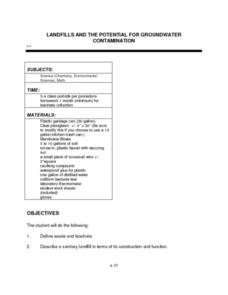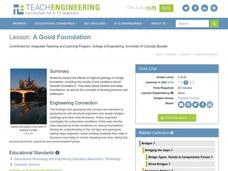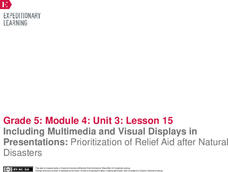Curated OER
Layers Of The Earth
Students examine the layers of the earth and the basic composition and thickness of each. Using construction paper, each student models the layers of the earth.
Curated OER
The Writing Process Continues (Revising and Editing)
For this writing process lesson, elementary schoolers revisit their rough draft copies for areas to improve. They are provided with a checklist to assist them then they conference with the teacher.
Curated OER
the Young Offenders Act: Modeling Parliamentary Proceedings
Students examine parliamentary procedure by following rules of order, constructing and presenting well thought out arguments, and submitting reports of the proceedings.
Curated OER
A Model of Three Faults
Pupils investigate faults. In this science instructional activity, students explore the many stresses and strains in the earth's layers and research the types of faults in their state.
Curated OER
Landfills and the Potential for Groundwater Contamination
Learners examine how a sanitary landfill is constructed, how it functions, and how waste and leachate affects the areas around the landfill. After a discussion about landfills and leachates, students construct a Sanitary Landfill Model...
Teach Engineering
Hurricanes
When a levee fails, it means disaster. Introduce your class to hurricanes and the technologies used to help protect against them. The included presentation provides background information using Hurricane Katrina as a reference.
Teach Engineering
Design a Flying Machine
Wrap up the unit in one final design. Pairs use their knowledge of aviation to design new flying machines and record how their designs take into consideration the forces that act upon airplanes. The pupils determine whether their designs...
DiscoverE
Spaceship to Mars
Feel like a rocket scientist for the day. Using only paper and tape, scholars create a framework for a spaceship to Mars. Each sheet of paper costs $10 million and each piece of tape costs $100,000. Make sure you stay within budget!
PBS
Working with Coordinate Planes: Assessments
It's time for scholars to show what they know about coordinate planes with a collection of three assessments. The exams' objectives include plotting points on a single grid, measuring using the distance formula, and identifying...
Teach Engineering
A Good Foundation
It takes a strong foundation to build a house and a stronger one for a bridge. This resource presents the effects of geology and soil on bridge foundations. Working in groups, the class investigates the interaction of shallow and deep...
Science Matters
Slip Sliding Along
The San Andreas Fault is the largest earthquake-producing fault in California. In the seventh lesson in the 20 part series, pupils create maps of California, focusing on the San Andreas Fault system. The comparison of where...
EngageNY
The Mathematics Behind a Structured Savings Plan
Make your money work for you. Future economists learn how to apply sigma notation and how to calculate the sum of a finite geometric series. The skill is essential in determining the future value of a structured savings plan with...
Chicago Botanic Garden
Nature Walk and Ecosystem Introduction
A food web has no organism higher than a tertiary consumer because there wouldn't be enough energy left to sustain them. The fourth installment in a seven-part series begins with a nature walk to get pupils thinking about their...
EngageNY
Including Multimedia and Visual Displays in Presentations: Prioritization of Relief Aid after Natural Disasters
It's time to put the plan into practice. Using their plans from the previous instructional activity, scholars create multimedia and visual displays for their opinion speeches. Next, they watch videos of speeches and use a presentation...
K12 Reader
Active and Passive Transport
Active and passive systems used to transport materials to and from cells are the subject of a comprehension worksheet that asks readers to use information from the article to answer a series of questions based on the text.
K12 Reader
Conflict Over North American Lands
Readers are introduced to some of the conflicts that arose over land and resources in the Americas in a two-part cross-curricular comprehension worksheet that asks kids to study the article and then to use information provided to...
Other popular searches
- Area Model Multiplication
- Fractions Using Area Models
- Probability Area Models
- Multiplication Area Models
- Arrays and Area Models
- Binomial Area Models
- Area Model Fractions
- Area Models and Distribution
- Area Model of Multiplication
- Modelling Local Area
- Area Models Presents
- Mixed Numbers Area Model

















